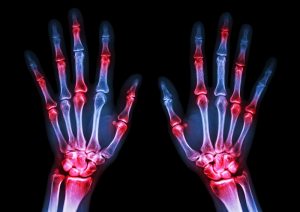 The following is a guest blog from Alvin H. Danenberg, DDS, a renowned nutritional periodontist and certified LANAP clinician, and author of Crazy-Good Living!: Healthy Gums, Healthy Gut, Healthy Life. The original post can be found on Dr. Danenberg’s website.
The following is a guest blog from Alvin H. Danenberg, DDS, a renowned nutritional periodontist and certified LANAP clinician, and author of Crazy-Good Living!: Healthy Gums, Healthy Gut, Healthy Life. The original post can be found on Dr. Danenberg’s website.
Periodontitis is a chronic inflammatory disease. Rheumatoid arthritis (RA) also is a chronic inflammatory disease. In addition, both have autoimmune characteristics. Many people who have periodontitis have rheumatoid arthritis. Likewise, many people who have rheumatoid arthritis have periodontitis. Which came first? Current medical research offers a robust discussion. Yet, the dilemma continues – which came first?
There is another question that may be more basic: Could there be a common cause for both diseases?
Chronic Inflammation
A common cause for periodontitis and rheumatoid arthritis might be chronic systemic inflammation. If that were the case, then the manifestations of periodontitis and rheumatoid arthritis could depend on individual genetic predispositions and host response.
Chronic systemic inflammation is a complex system of “healing events”, which does not shut off naturally. Inflammation doesn’t shut off because an acute injury, which created the inflammatory response in the first place, persists.
In a healthy situation, when the body is harmed, the immune system creates inflammation to heal the injury. However, if the insult to the body becomes constant, then the body cannot turn off its internal “emergency reaction”. The immune system continues to be activated. Normal inflammation becomes chronic. Elements of chronic inflammation begin to destroy healthy tissue throughout the body and manifest into many chronic diseases.
Medical Research
Here are some thoughts from current medical research:
- Chronic inflammation causes many chronic degenerative diseases. In this paper, the authors use the lens of evolution to describe various factors that affect the development of chronic inflammation. If insults, which create acute inflammation, are not removed within three to eight weeks, the body begins a destructive path leading to chronic diseases.
- Dental plaque is made up of many types of microbes, which are in a balanced state during health. What can cause the dental plaque to become unhealthy? Environmental factors affect a person’s immune system. If the immune system is compromised, then the host response can be altered and become destructive. A compromised immune system and a negative change in the host response can allow various bacteria in dental plaque to overgrow and become extremely pathogenic. Some of these harmful bacteria are resistant to the immune system’s attempt to kill them. The result is further development of chronic inflammation. In turn, there is damage to the jawbone and potential spread of infection as well as elements of chronic inflammation to various parts of the body. This article helps explain this process.
- A specific virulent bacterium associated with periodontitis, Porphyromonas gingivalis, uniquely produces an enzyme called peptidylarginine deiminase (PPAD). This research has linked this production of PPAD by P. gingivalis to the creation of specific antibodies, which might cause the development of rheumatoid arthritis. These antibodies can be identified many years before the patient experiences clinical symptoms of RA.
Summary
Chronic inflammation causes many different types of chronic disease. Specifically, the apparent initial cause of periodontal disease and rheumatoid arthritis is chronic systemic inflammation. Once periodontitis has become active, the production of PPAD and its resulting antibody production may cause the development of rheumatoid arthritis or aggravate existing rheumatoid arthritis. A vicious cycle is at work between periodontitis, rheumatoid arthritis, and chronic inflammation. So, what is a person to do?
First and foremost, whatever is causing the progression of chronic inflammation must be eliminated completely. If there are foods and chemicals in the diet that are stoking the flames of inflammation, these must be avoided. Other irritating environmental factors need to be identified and removed. If there is damage to the gut lining or an increase in pathogenic microbes in the gut, these must be treated. If there is active gum disease or any other source of active infection, these must be resolved. Eliminating all sources of chronic inflammation is essential for a healthy outcome. Only treating the symptoms of periodontitis and rheumatoid arthritis would not assure a healthy outcome.
So, which came first – periodontitis or rheumatoid arthritis? It could be a toss up, but treatment must eliminate the ultimate and common cause, which is chronic inflammation.


Leave a Reply